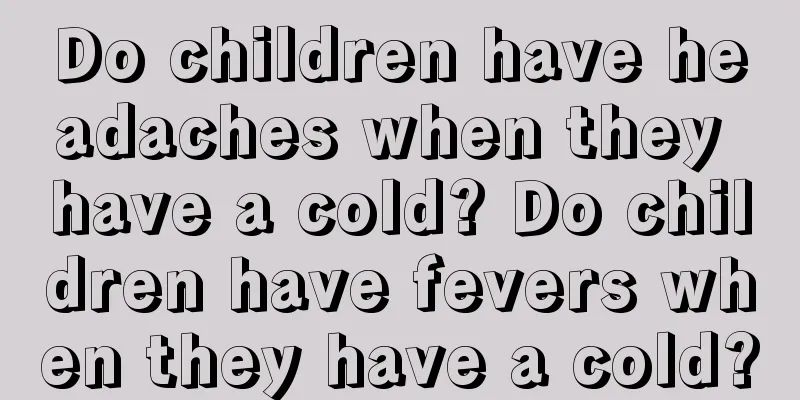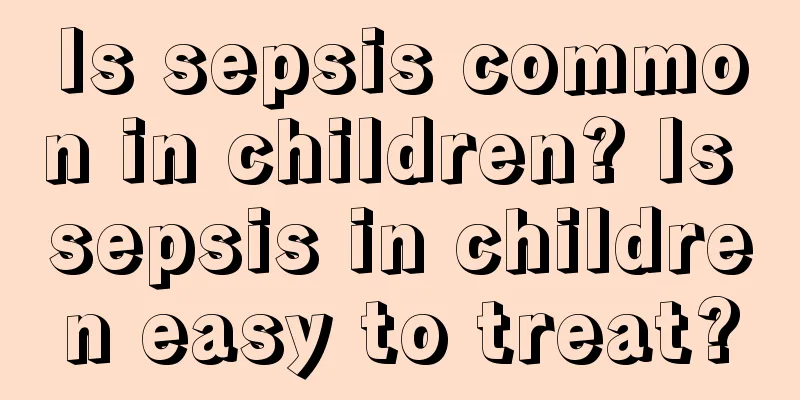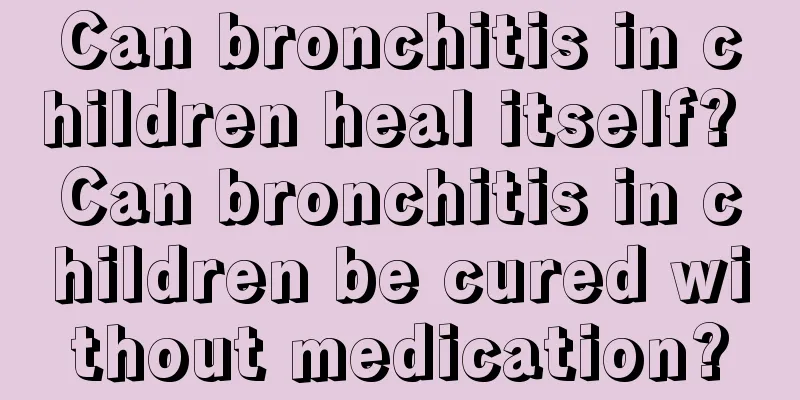Do children have headaches when they have a cold? Do children have fevers when they have a cold?

|
We all know that children have poor immunity, so they are very easy to get sick and catch a cold. Sometimes a cold in a child can cause some complications. So we need to know whether a cold in a child will cause a headache? Will a cold in a child cause a fever? Do children have headaches when they have a cold?Children's colds can cause headaches, but the degree of headaches varies because the degree of colds varies from person to person. After catching a cold, children will have a certain inflammatory response, which will cause headaches, accompanied by body muscle aches, lack of strength, and of course typical symptoms such as fever and cough. Usually accompanied by fever, when fever can also be accompanied by body muscle pain, joint pain or fear of cold symptoms, headache is just a symptom of fever, which is a relatively common situation. Therefore, during the period when children catch a cold, they must be allowed to drink more warm water, pay attention to rest, eat more nutritious foods, and eat more fresh vegetables and fruits, which is conducive to recovery. When the fever drops to normal body temperature, the headache usually disappears. In addition, the child's body temperature should be measured regularly, and it is necessary to give the child anti-inflammatory and antipyretic drugs. Encourage children to exercise appropriately to enhance their resistance. Do children have a fever when they have a cold?There are many types of colds, the most common common cold, colds of wind and cold type, and influenza. The initial characteristics of these various colds are roughly the same, such as runny nose, tears, nasal congestion, etc., but not all colds will cause fever. Therefore, children with certain colds may not have fever. For example, some mild common colds and colds of wind and cold type will cause children to have some mild symptoms such as runny nose, cough, nasal congestion, but sometimes there is no fever. And most of these colds are self-healing diseases. Generally, they can be cured in about a week by keeping warm, drinking more hot water, regulating diet, and paying attention to rest. However, viral colds with epidemic characteristics will mostly cause fever in the baby's body, especially in severe cases, it is very easy to have a high fever. Moreover, viral colds often develop rapidly and are serious, so as parents, we must be vigilant and give the baby timely diagnosis and treatment. Will children feel dizzy when they have a cold?Generally speaking, children do experience dizziness during a cold, mainly because the body temperature will rise at this time, which will cause related vasodilation. This will lead to symptoms such as dizziness, which is a relatively normal manifestation. Children with colds may experience dizziness, which may be related to fever, blood pressure, anemia, blood sugar, etc. You can take cold medicine and antiviral drugs under the guidance of a doctor, give your child more warm water, eat more nutritious and easily digestible food, or take your child to the hospital pediatric department for a blood test, fasting blood sugar and other related tests to determine the cause before treatment. Will children have nosebleeds when they have a cold?If a child has a cold for a long time, he or she will have symptoms of coughing and inflammation. In severe cases, the lungs will be infected and cause pneumonia. In severe cases, it will cause a fever, which is also a protective reaction of the body. Low fever does not require medication. A high fever will cause a series of symptoms such as drowsiness, dryness of the nasal cavity, and easy bleeding of the mucous membrane. Not everyone is like this, and individual differences vary. Don't worry if this happens occasionally, and no special treatment is needed. Just drink more water to keep the nasal cavity moist and don't pick your nose. If it happens frequently, you should go to the ENT department, check blood routine, do a nasal endoscopy, and further diagnosis and treatment. |
<<: Pick up your child from school: 3 things parents should avoid
>>: How long can a newly opened can of milk powder be kept? Misconceptions about milk powder storage
Recommend
Why is the baby's nose dry? Two reasons need to be paid attention to
The baby's resistance is relatively weak, so ...
Is it necessary to add oil to baby food? What are the conditions for adding baby food?
Usually, when babies reach a certain age, their m...
The correct way to hold a baby The correct way to hold a baby
Many parents who become fathers for the first tim...
What skin types are suitable for Shanghai sulfur soap? Can Shanghai sulfur soap be used on oily skin?
Shanghai Sulfur Soap is also an old brand. Some p...
How can I choose a more original name? How can I choose a name with less repetition?
Have you ever seen newborns being named in your l...
What should I do if my baby loves watching TV? Does it have any effect on the baby's eyes?
What should I do if my baby loves watching TV? Ma...
Jasper wears sunglasses, looking cool makes the child more confident!
Jasper has become extremely popular since he part...
How to deal with baby crying at night? Methods to improve night crying
The first is to create a comfortable sleeping env...
What can children eat to enhance their immunity?
Children with poor resistance can easily get sick...
Signs that your baby can talk and the reasons why your baby rolls his tongue when speaking
Most parents are looking forward to their childre...
Will sex hurt after giving birth? Will women's sexual desire increase after giving birth?
After giving birth, a woman's body has been t...
Can baby powder be used on baby eczema? Can baby eczema be applied with baby powder?
Babies' skin is usually very sensitive, so th...
Mom recommends: Moony Japan's top-grade wet wipes are super easy to use
Products for babies are not the most expensive, b...
Will calcium deficiency affect children's sleep? Will calcium deficiency affect children's growth?
Usually, children's growth and development ca...
Beware of the secret recipe in Legend of Miyue and pay attention to scientific pregnancy protection
Palace dramas have been very popular in recent ye...









